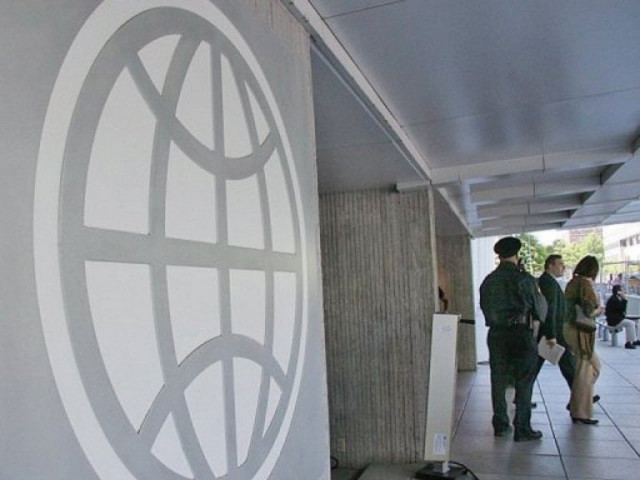World Bank paints mixed picture of economy
Advises govt to book circular debt on budget; says Pakistan will miss growth, deficit targets

PHOTO: AFP
With the government still skirting around the issue of circular debt, the World Bank (WB) has said Pakistan will ultimately have to book this liability – which currently stands at a whopping Rs661 billion – on the budget to improve performance in the energy sector.
The Washington-based lender’s ‘advice’ – published in its Pakistan Development Update released on Wednesday – highlights a contentious issue the Pakistan Muslim League-Nawaz (PML-N) government has been brushing under the carpet while highlighting its performance on the fiscal front.
World Bank warns climate change could add 100 million poor by 2030

The report also paints a mixed picture of Pakistan’s economy, saying that the country will miss its annual growth rate target of 5.5% by one percentage point and that investment will also remain flat at 15.1% of the total size of national economy during the current fiscal year. Meeting the 4.3% fiscal deficit target for this year also hinges on the performance of the Federal Board of Revenue and the materialisation of privatisation proceeds, according to the lender.
Although reforming the energy sector continues to be a top priority of the PML-N government, the domain inhibits much needed private investment and is generating significant fiscal outlays in the form of subsidies and accumulation of circular debt, WB said.
“Circular debt will ultimately have to be financed through the budget,” it added.
World Bank statement: Extreme poverty to fall below 10% in a first
Immediately after coming to power in June 2013, the PML-N government cleared Rs480 billion worth of circular debt. It booked the liability in the last year of its predecessor, the Pakistan Peoples Party-led government, and has refused to take circular debts on its book since then. Under the PML-N, the finance ministry has argued that circular debt is not part of the general government definition.
While the International Monetary Fund (IMF), which has extended a $6.2 billion loan to Pakistan, has supported the PML-N stance on circular debt, independent economists say the current fiscal consolidation maintained by excluding this liability does not portray the real health of the country’s economy.
The government ended the last fiscal year with a 5.4% budget deficit minus circular debt. With these dues included, the deficit would amount to 7.6% of GDP.
Pakistan now 138th among 189 economies
Pakistan’s circular debt has swelled to Rs661 billion this year, IMF’s Washington-based mission chief for the country said last week. The amount includes Rs335 billion parked in the Power Holding Company till the end of September.
WB in its report said Pakistan’s investment to GDP ratio will remain flat at 15.1% this fiscal year, which is about half the average for South Asia. It said private investment in Pakistan is declining despite a more stable macroeconomic environment and the government’s broader efforts to attract investment. Foreign Direct Investment in Pakistan is also declining and, at just 0.3% of GDP, is the lowest in a decade for the country and among the lowest in South Asia, the lender added.
“Low investment has implications for Pakistan’s long-term growth potential,” WB said. It cited low domestic savings as one important reason for this – Pakistan’s domestic savings rate falls in below 10%, compared to the 25% average for South Asia.
Pending IMF and World Bank reforms
Pakistan’s exports are not picking up as well and might be further affected by the recent economic slowdown in China and weak recovery in the European Union. China accounts for 10% of Pakistan’s exports.
A recent report by the Moody’s international credit rating agency also warned that Pakistan’s debt affordability has weakened due to increasing reliance on expensive foreign borrowings through international bonds. Total public debt stood at 64.6% of GDP at the end of last fiscal year 2014-15 against statutory requirement of limiting it to 60% of GDP, said the WB.
The WB said that the GDP growth during current fiscal year is projected at 4.5%, below the official target of 5.5%. Fiscal consolidation may also be negatively affected by delayed implementation of the government’s privatisation agenda, it said. Deviating from the targeted 4.3% budget deficit may force government to increase its financing from commercial banks, which may continue to crowd out private sector credit, the lender added.
Published in The Express Tribune, November 12th, 2015.


















COMMENTS
Comments are moderated and generally will be posted if they are on-topic and not abusive.
For more information, please see our Comments FAQ